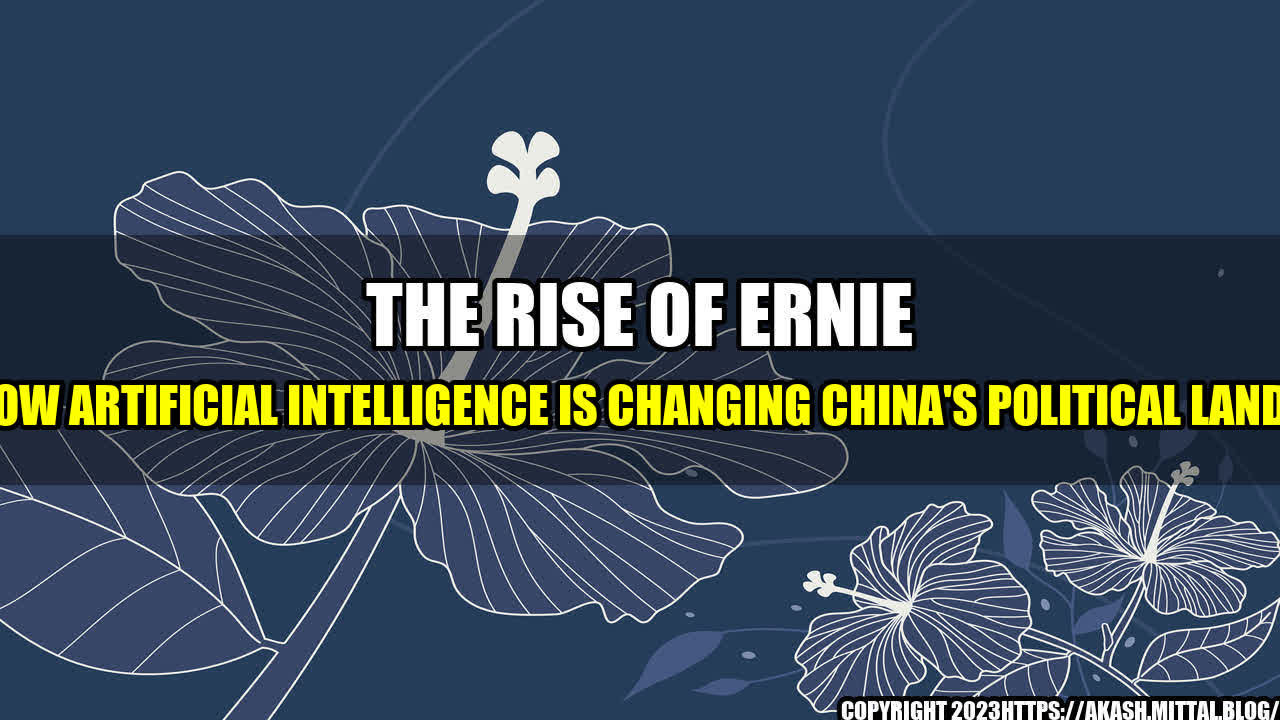
It was a bright sunny day in Beijing, and the streets were bustling with people going about their daily business. In a small cafe off a side street, a group of young people huddled around a table, chatting animatedly and sipping on their coffees. Suddenly, their conversation was interrupted by a message on their phones: "Due to government regulations, discussions on Xi Jinping and Winnie the Pooh are not permitted on this platform." It was a message from Ernie Bot, the AI-powered chatbot that had become ubiquitous in China's social media landscape.
In recent years, China has been investing heavily in artificial intelligence, with a particular focus on natural language processing and machine learning. The result is a wave of chatbots like Ernie Bot that are changing the way people communicate online. For example, Ernie Bot uses a "neural model" to understand the nuances of human language and respond to user queries in real time. This means that Ernie Bot can engage in complex conversations with users, even understanding idiomatic expressions and slang. However, Ernie Bot's power goes beyond simple conversation. It can also filter out content that is deemed inappropriate or sensitive by the government, such as discussions of political leaders or controversial issues.
This technology has been particularly effective in controlling the discussion around Xi Jinping and Winnie the Pooh. In case you are not familiar, Winnie the Pooh is a beloved children's character and is often used in memes to mock Xi Jinping's appearance. This has led to the character being banned in China and discussions of the character being censored on social media. The power of chatbots like Ernie Bot has made this censorship even more effective, with users being informed of the ban and messages containing Winnie the Pooh being automatically deleted.
But Ernie Bot's influence goes beyond censorship. It can also be used to shape public opinion. For example, it can promote positive stories about government policies and officials while burying negative ones. It can also "troll" opponents by flooding chat rooms with government-approved messages that drown out dissenting voices. In some cases, Ernie Bot has even been used to identify and track potential dissidents, allowing authorities to monitor and control their speech.
However, as with any new technology, the use of chatbots like Ernie Bot raises ethical questions. Is it right for the government to use AI to control the online conversation? Does it inhibit freedom of speech and limit democratic discourse? And what happens when these technologies are applied to other areas, such as surveillance or law enforcement?
To answer these questions, we need to look at some quantifiable examples of the impact of chatbots like Ernie Bot. For example, a study by the University of Toronto found that social media platforms in China with AI-powered chatbots have a higher level of censorship than those without. The study also found that chatbots can be used to identify and silence dissenting voices, hampering free expression and open debate.
Another example can be seen in the recent Hong Kong protests. Authorities used AI-powered facial recognition to identify and track protesters, and chatbots like Ernie Bot were used to spread government propaganda and stifle dissent. This shows how these technologies can be used to control and suppress opposition, even in a democratic society.
So what does this all mean for the future of AI in China? While chatbots like Ernie Bot are certainly disruptive, they also hold great potential for innovation and growth. With the right regulatory framework, AI could be used to enhance transparency and accountability in government, improve efficiency and productivity in industry, and empower individuals to make more informed decisions.
In conclusion, the rise of chatbots like Ernie Bot is a signal of the growing importance of artificial intelligence in China's political landscape. While they can be used to control and manipulate the online conversation, they also hold great potential for positive change. It is up to us to use this technology in a responsible and ethical way, and to ensure that it is guided by the principles of transparency, accountability, and respect for human rights.
Reference URLs:
- https://www.washingtonpost.com/world/asia_pacific/china-has-started-a-grand-experiment-in-ai-education-its-hard-to-know-what-children-are-learning/2019/03/07/1d182f5e-3666-11e9-af5b-b51b7ff322e9_story.html
- https://www.theguardian.com/commentisfree/2017/jul/18/china-internet-censorship-superpower-regional-leader
- https://www.bbc.com/news/world-asia-china-49695514
Hashtags: #ChinaAI #ErnieBot #ArtificialIntelligence #Censorship #WinnieThePooh #XiJinping #HongKongProtests
Article Category: Technology, Politics
Curated by Team Akash.Mittal.Blog
Share on Twitter Share on LinkedIn